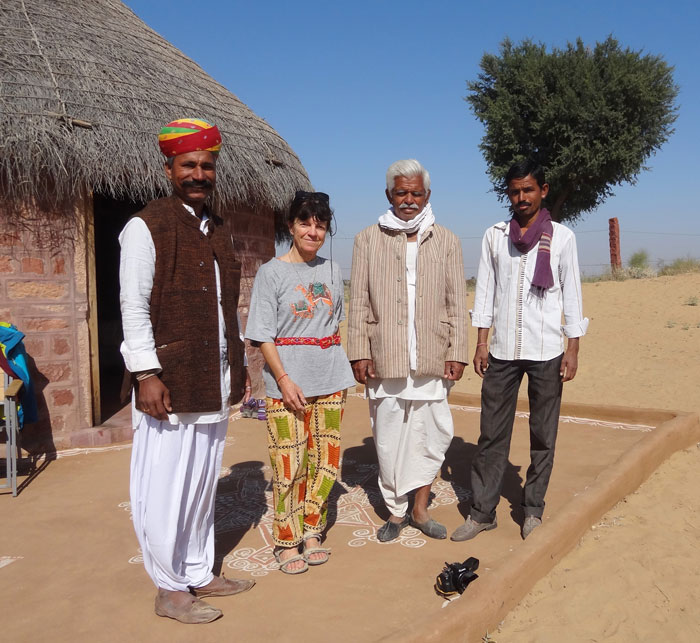Responsible Tourism HACRA A Responsible travel ORG being a responsible eco-tour operator from Rajasthan is at the heart of what HACRA Dhani is all about. From the start, HACRA has been committed to offering low-impact tours that benefit traveller and local host alike. We work with local communities, small businesses and other NGO’s to develop sustainable tourism opportunities that help local economies while minimizing negative environmental and cultural impacts. As a traveller on a HACRA eco-tour, this results in a more enjoyable and authentic travel experience. We believe that tourism should be about interacting with other cultures, not exploiting them.

This could mean travelling on public buses with the local people rather than looking at them through the window of a private tour bus or staying at a small, locally owned guesthouse rather than a large, foreign-owned hotel. It also means travelling in small groups that are less intrusive and offer more opportunity for local interaction. Part of HACRA’s operating philosophy is to respect the communities in which we visit. We do this by acting in a manner that is environmental, socially and economically responsible. While our sustainable tourism policies are constantly evolving, our commitment to socially conscious, grassroots style travel has never changed. In recognition of our efforts in the area of social responsibility, HACRA won the chain’s of recommendations by leading guide-book and hundreds of traveller every year.
We are proud of our reputation, the work we do with local communities and the way of travel we offer to our guest. Our Travel Way In order to minimize the potentially negative social and environmental impacts of tourism, HaCRA offers small group adventures that respect local people, cultures and their environment. We use local transportation, small-scale hotels, family-run guest houses and employ local guides and operators. This approach to travel ensures that economic benefit goes directly to local businesses and communities and allows interaction with local people and their culture. Group Size In order to keep the environmental and negative social impact to a minimum, we operate the majority of our tours with a maximum of 6-8 guests. Transport By using local methods of transportation (public buses, trains, local jeeps and local camel/carts ), our travellers experience face-to-face interaction with local people.
This also reduces unnecessary fuel consumption and pollution. While we generally use public transportation, we also offer ‘Comfort Class‘ tours that utilize private transport, operated by local companies and drivers. Accommodation The majority of our hotels are small, locally owned and family operated establishments. We also incorporate community and family homestays in Rajasthan’s cities- Jodhpur, Udaipur, Bundi, Bikaner and Jaisalmer. Local Guides & Operators By working with local guides and operators, HaCRA provides economic benefits directly to local people and small businesses. Our local guides are experts in flora and fauna, history and culture, and provide our guests with an insight into local knowledge. Tour Leaders Our Tour Leaders receive special training in low-impact travel, regional conservation issues and projects. They are also provided with a Sustainable Travel Manual. Tour Leaders are selected based on their knowledge of, and commitment to, sustainable travel. All Tour Leaders speak good English and have First Aid. Food While we include meals during Safaris, camping and in isolated areas, our Tour Leaders are able to recommend locally owned restaurants in all cities, countrysides and towns. By eating in local restaurants and purchasing food in local markets, our guest help to support the local economy. Ecotourism Standards Use of local transportation. All HACRA Adventures team/family and partners are aware and knowledgeable of the Standards program. Reduce, Reuse (and Recycle whenever possible). The annual contribution to conservation and community development NGOs (non-governmental organizations). Promote Standards in all local campaigns. Provide employment and/or business opportunities to local people. Suppliers are encouraged to improve there own environmental/social standards. Maximum group size is 6-8 guests on all HaCRA Tour guide/Leader-led tours. HACRA ensures that local people and other travellers are aware of the benefits of conducting small-group tours. No use of suppliers who support exploitative practices. For example, we don’t condone selling endangered species products, harming threatened habitats or prostitution. Tour guides or Leaders Tour guides or Leaders are fluent in English and some speak French as well. Tour Leaders receive special training in low-impact travel (in an environmental and social context), regional conservation issues and/or projects, and are selected based on their knowledge, commitment to and awareness of sustainable travel. Tour Leaders must possess First Aid. Tour guides or leaders are encouraged to research the eco-friendly way of travel, accommodation, and possible projects that can be incorporated into our tours. Accommodation All hotels have less than 15rooms, except joining and departure points, which have less than 50. Otherwise, the best feasible option is employed. Best feasible option means that if there is an alternative that is a more responsible option in terms of the social and natural environment, this can be taken.
The majority of accommodation is locally owned. Future Targets Continue to monitor operations at the local level. This includes evaluating the level of resource management and employment practices for all suppliers used by HACRA. Selection of suppliers is to be based on these criteria. Participate in clean-up/conservation/community development projects in areas that may require support and that HaCRA tours visit. Create new partnerships with more environmental and community development NGOs on both international and local levels. Design new tours that support more local communities and eco-friendly operators. Continue to incorporate visits to HACRA Dhani‘s rural development projects into our tours. Code of Conduct for Guest As a guest, you can do a lot to help ensure that tourism in developing countries remains a positive experience for everyone. The following guidelines offer suggestions for low-impact and culturally sensitive travel: Stay on the trail Straying from the trail while safaris, trips in remote villages and hiking can cause erosion and other environmentally harmful impacts. Respect the wildlife Viewing animals from a safe distance is fine; touching, feeding, or cornering them is not. Respect endangered species Do not buy products that exploit wildlife, aid in habitat destruction, or come from endangered species. Do not litter This is one time when the old adage “When in Rome, do as the Romans” doesn’t apply. Even if you see a local person littering, set an example and dispose of your garbage appropriately. Reduce waste Recycling is extremely limited or non-existent in most villages and city areas. Avoid products with excess packaging; opt for beverages in glass bottles as they tend to be re-used. Protect local water systems In desert areas of India we have a major problem of drinking water, so please make sure about consuming water on trip/safaris. Respect cultural differences Local customs and traditions may be different from our own. Take the time to learn what behaviour is acceptable and what isn’t. Take photos with care Always ask permission to take photos of people and respect their wishes if they refuse. If you do take a photo, offer to send copies back to them and make sure to follow through with your promise. If your subject wants immediate compensation in return for the photo taken, offering a piece of fruit or cookies, or a souvenir from your home is ways to do it. Learn a few phrases Take the time to learn about the country state, city and village you are visiting. Learning about the customs and a few words in the local language can go a long way and is appreciated by the local people. It also makes your interactions more meaningful and memorable. Giving Gifts HaCRA highly discourages offering money to people begging on the streets of some places in the country. Parents often send their children out into the streets, since a child can make more than their parents make begging on the street. This promotes further dependency and encourages more parents to send out their children. Instead, we would suggest offering a piece of cookies or fruit. Perhaps you could offer a postcard from your home etc. Support Local Artisans Support local artists and artisans by purchasing locally made goods.
Many communities sell handmade crafts that you may purchase while on tour. You may also ask your Tour guide or Leader for recommendations about where to find local markets, stores and cooperatives. Making A Difference Donations Often guests who return home from a trip having interacted with local people and experiencing life in another culture, look for ways to give back to those less fortunate than themselves. It is for this reason that we developed the HACRA Dhani Foundation. Through fundraising and donations, we are able to provide needed items to local people, communities, schools and organizations that you visit on your tours. Volunteering There are also many organizations working worldwide that you may choose to volunteer with. Volunteering abroad in the place you visits can be an extremely rewarding experience with local people and culture. Giving Back On Tour Starting in 2001, HACRA is proud to announce the development of a new tour for travellers who wish to have a true cultural experience while helping to improve the basic living conditions in remote Bhisnois, bhils-bhopas and Rajput communities. For more information about this tour visit RVT India. This tour was specially designed as a way to give back to the people and places we visit on our tour by incorporating a hands-on volunteer project. We will also have the opportunity to visit development projects, the environment ( plantations in orans and in schools). Project which improve the local environment in dry desert areas. Proceeds from this tour will go to the HACRA Dhani Foundation in support of community projects in Desert villages. A sustainable tourism with a local development What is Eco-tourism? Fundamentally, eco-tourism means making a little environmental impact as possible and helping to sustain the indigenous populace, thereby encouraging the preservation of wildlife and habitats when visiting a place. This is a responsible form of tourism and tourism development, which encourages going back to natural products in every aspect of life. It is also the key to sustainable ecological development. Aware of the Environment. Today the “Green Laws” of conservation is making people aware of how man and the environment can live symbiotically for more time to come and eco-tourism is the only way maximize the economic, environmental and social benefits of tourism. Everyone is a stakeholder in the process and we clearly need to avoid our past shortcomings and the negative impact that they have had. In India too the movement is gathering momentum with more and more travel and travel related organisation’s are addressing the needs of the eco-tourists and promoting eco-tourism in the country.

Hans Overeem & Yvette Seppenwoolde, Netherland

Thank you so much for making our stay so interesting and enjoyable. you made a fantastic birthday party for Sarah. We will never forget sitting around the fire under the stars listening to the enchanting music of Rajasthan.
John & Sarah, Bristol, England

We enjoyed every moment of all the time we spent with you and your family. This was the real Rajasthan that we Marwaris had wanted to see for a very long time. The warmth and APNAPAN you showed us by having us as a guest in your house, was really special to us and we would cherish these moments and memories for all our lives. Thanks from the bottom of our hearts.
Divya & Chanchal Agarwal, Banglore, India





Thank you for all the kindness, good food and a lot of stories that give more insight and understanding of life and history in India. We love the quietness and peace if the desert an unforgettable experience.